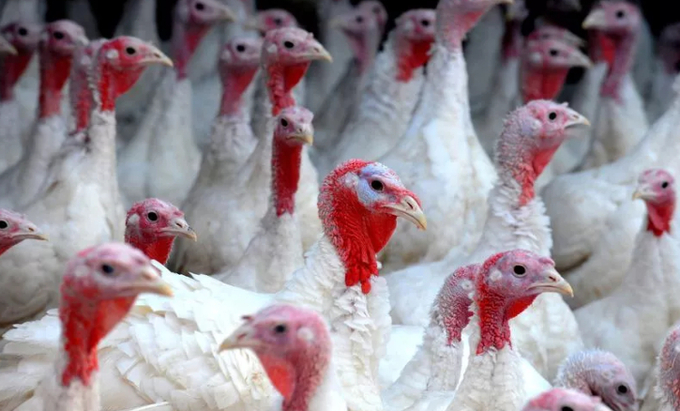June 18, 2025 | 08:06 GMT +7
June 18, 2025 | 08:06 GMT +7
Hotline: 0913.378.918
June 18, 2025 | 08:06 GMT +7
Hotline: 0913.378.918

The bird flu outbreak could spell a Christmas without turkey dinner for Brits this year, farmers have warned. The worst bird flu outbreak in UK history has already led to three million turkeys being culled as part of efforts to keep the disease under control. Special protection zones have been set up in Norfolk, Suffolk and parts of Essex as well as across the entirety of south-west England to protect the remaining livestock . Photo: Owen Humphreys/PA Wire
This year’s deadly avian flu outbreak has busted through all previous records, killing so many birds that shortages are contributing to egg and poultry price increases for U.S. consumers who are already plagued by food inflation not seen in 40 years.
Here’s the situation report:
The highly pathogenic, highly contagious avian flu has led to the deaths of 52.7 million birds between February and December. That exceeds the previous record of 50 million during 2014-15.
Only one known person has tested positive for avian influenza A(H5) virus (H5 bird flu) in the U.S., as reported by Colorado and confirmed by CDC. This case occurred in a person who had direct exposure to poultry and was involved last April in the culling (depopulating) of poultry with presumptive H5N1 bird flu.
That person reported fatigue for a few days as their only symptom and has since recovered. The person was isolated and treated with the influenza antiviral drug oseltamivir.
Avian flu kills some of the birds, but most are culled as the only that’s the only method known to stop the virus from spreading. That meant that millions of chickens and turkeys that were raised commercially for eggs or meat were lost to the disease.
The virus is 100 percent fatal and spreads quickly through droppings, contaminated feed or water, or saliva.
Avian influenza (AI) is caused by the influenza type A virus which can infect poultry (such as chickens, turkeys, pheasants, quail, domestic ducks, geese, and guinea fowl) and wild birds (especially waterfowl).
AI viruses are classified by a combination of two groups of proteins: hemagglutinin or “H” proteins, of which there are 16 (H1–H16), and neuraminidase or “N” proteins, of which there are 9 (N1–N9). AI viruses are further classified by their pathogenicity — the ability of a particular virus strain to produce disease in domestic chickens.
Highly pathogenic avian influenza (HPAI) virus strains are extremely infectious, often fatal to chickens, and can spread rapidly from flock to flock.
Low pathogenicity avian influenza (LPAI) virus strains occur naturally in wild migratory waterfowl and shorebirds without causing illness. LPAI can infect domestic poultry, creating little or no signs of illness.
The H5Ni virus was first found in domestic waterfowl in Southern China in 1996 and has since spread around the world. This year’s record in the U.S. includes 46 states and according to USDA’s Animal and Plant Health Inspection Service (APHIS) was reached when the virus struck three large commercial turkey flocks in South Dakota and one large egg-laying operation in Nebraska.
Worldwide 160 million birds have been killed during the past year by the virus and almost 80 different bird species have been affected. Hungary reported an H5N1 outbreak in poultry, its first since June, according to a notification from the World Organization for Animal Health (WOAH). The virus hit a farm in Bekes County in the southwestern part of the country that houses 3,080 birds.
(FSN)

(VAN) Extensive licensing requirements raise concerns about intellectual property theft.

(VAN) As of Friday, a salmonella outbreak linked to a California egg producer had sickened at least 79 people. Of the infected people, 21 hospitalizations were reported, U.S. health officials said.

(VAN) With the war ongoing, many Ukrainian farmers and rural farming families face limited access to their land due to mines and lack the financial resources to purchase needed agricultural inputs.

(VAN) Vikas Rambal has quietly built a $5 billion business empire in manufacturing, property and solar, and catapulted onto the Rich List.

(VAN) Available cropland now at less than five percent, according to latest geospatial assessment from FAO and UNOSAT.

(VAN) Alt Carbon has raised $12 million in a seed round as it plans to scale its carbon dioxide removal work in the South Asian nation.

(VAN) Attempts to bring down the price of the Japanese staple have had little effect amid a cost-of-living crisis.